AI Shopping Apps: Top 10 Features, Benefits, and How to Choose the Right One for You

Shopping feels different today, doesn’t it? AI shopping apps now shape your experience with smart features that make every search, comparison, and purchase smoother. You get real-time personalization, deal tracking, and even virtual try-on, all designed to enhance user experience and save time. Take a look at how the demand for these apps keeps climbing:
Metric | Statistic |
|---|---|
AI in Mobile Apps Market Size (2024) | USD 21.23 billion |
Projected AI in Mobile Apps Market Size (2034) | USD 354.09 billion |
Active Users of AI-powered Apps Worldwide | 230 million |
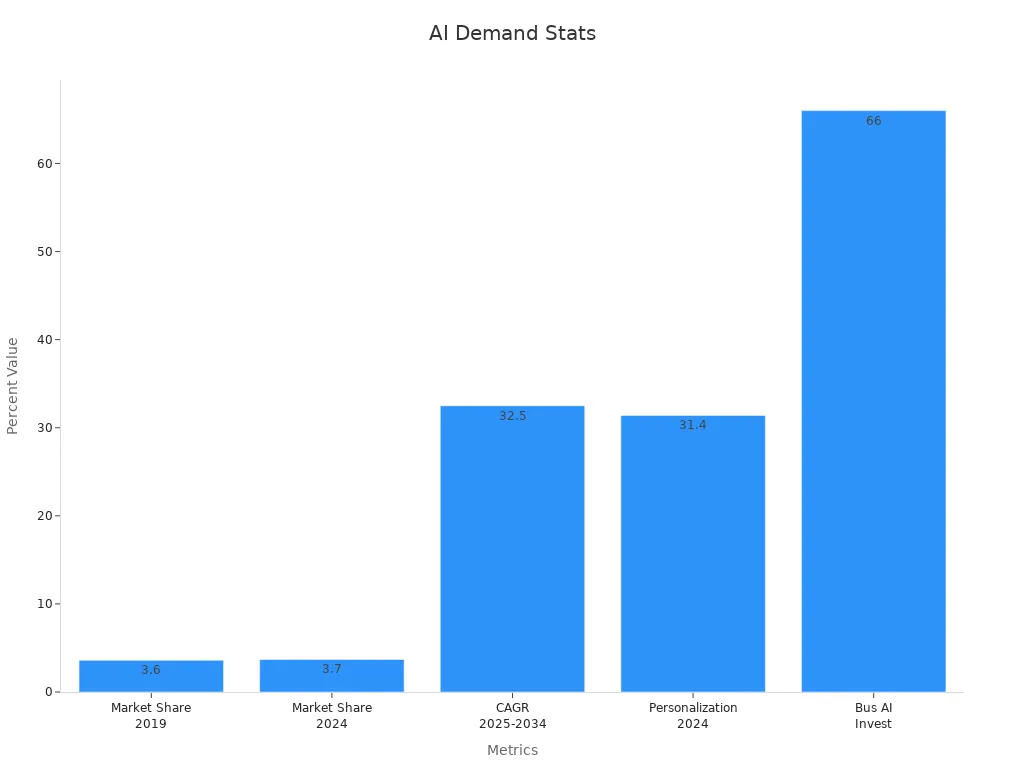
You can expect real benefits as more businesses invest in these tools, making your shopping journey faster, smarter, and more enjoyable.
Key Takeaways
AI shopping apps use smart technology to personalize your shopping, saving you time and making it more fun.
Top features like price comparison, deal tracking, virtual try-on, and AI chatbots help you find the best deals and get quick support.
These apps keep your payment and personal data safe with strong security measures.
Using AI shopping apps helps you save money, discover new products, and enjoy faster, easier shopping anytime.
To pick the right app, focus on your needs, check features, ensure device compatibility, and prioritize security.
AI Shopping Apps Overview
What Are AI Shopping Apps
You might wonder what makes ai shopping apps different from regular online shopping tools. These apps use ai to help you find, compare, and buy products in smarter ways. They blend machine learning, real-time data, and even generative ai to predict what you want before you even search. You get personalized recommendations, price alerts, and even virtual try-ons, all in one place.
Ai shopping assistants have become a big part of ecommerce. Almost half of U.S. adults now use ai tools to help them make shopping decisions. This shift shows how much ai shopping apps shape the way you shop. In fact, ai ecommerce apps now drive a huge part of the global market, with over 630 million downloads in 2024 alone. North America leads the way, but these tools are everywhere, helping people shop smarter and faster.
E-commerce platforms like Amazon and Walmart use ai shopping tools to manage inventory, predict trends, and personalize your experience. You see ai in action when you get product suggestions or see prices change in real time. These features make shopping easier and more fun.
How AI Enhances Shopping
Ai shopping assistants do more than just suggest products. They transform your entire ecommerce journey. Here’s how:
You get personalized product recommendations that match your style and needs.
Ai chatbots answer your questions 24/7, making customer service quick and easy.
Dynamic pricing means you see the best deals as they happen.
Ai shopping tools track inventory, so you rarely face out-of-stock issues.
Visual ai lets you search for products using images, making online shopping even more interactive.
Almost 65% of Americans know about ai chatbots, and 64% recognize ai in product recommendations. Retailers use ai ecommerce apps to boost engagement, cut costs, and improve customer satisfaction. You benefit from faster checkouts, better deals, and a smoother shopping experience. As ai shopping tools keep evolving, you can expect even more helpful features in your favorite ecommerce apps.
Top Features
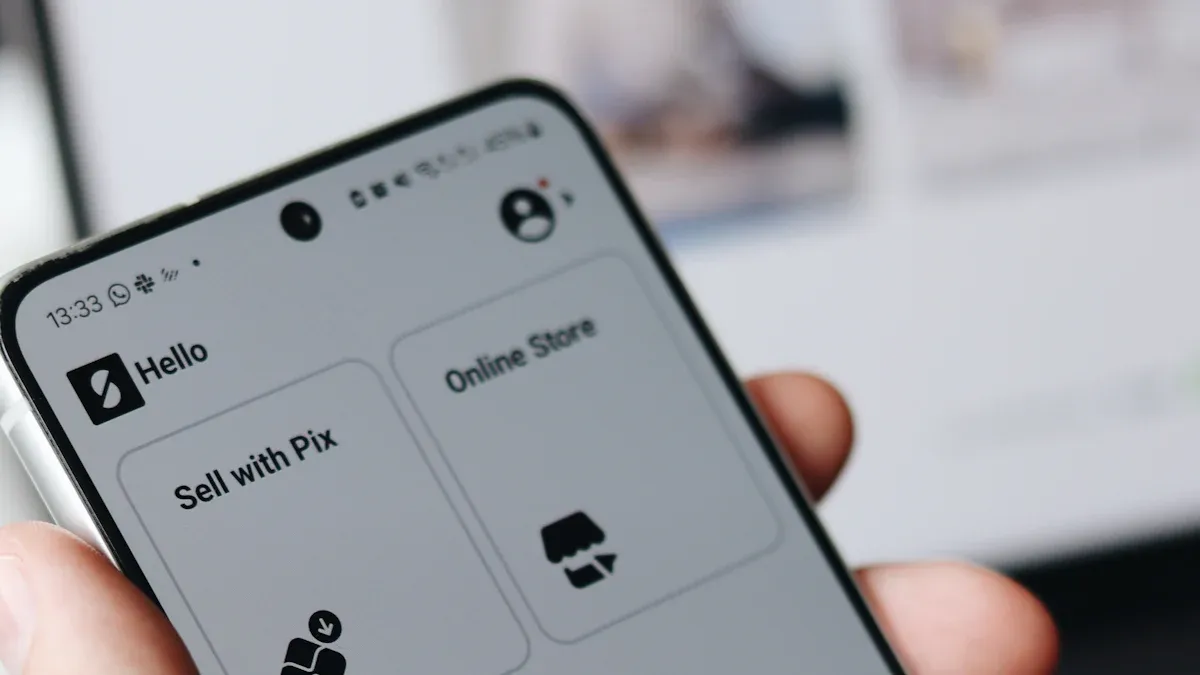
Personalization
You want shopping to feel like it’s made just for you. That’s where personalization comes in. AI shopping assistants use your browsing habits, purchase history, and even your style preferences to create personalized recommendations. These apps learn what you like and show you products that match your taste. You get personalized shopping experiences that save time and make shopping more fun.
Personalization isn’t just a nice extra. It drives real results. Over 70% of consumers expect personalization and get annoyed when they don’t see it. Nearly 56% of shoppers say they’ll come back if they get personalized recommendations. Companies that use ai-powered personalization see up to 40% more revenue. Nike’s personalized program brought in $10 billion in sales, and Gap boosted online sales by 60% with personalized product displays.
Statistic Description | Impact on Shopper Engagement |
|---|---|
46% of customers want personalized online shopping experiences | Shows significant demand for personalization in digital retail |
56% of online shoppers are more likely to repeat business with personalized recommendations | Demonstrates personalization’s role in repeat engagement and loyalty |
Offering personalized experiences can increase company revenue by 40% | Links personalization directly to revenue growth and engagement |
Nearly 75% of consumers won’t buy without personalization | Indicates personalization is critical for purchase decisions and engagement |
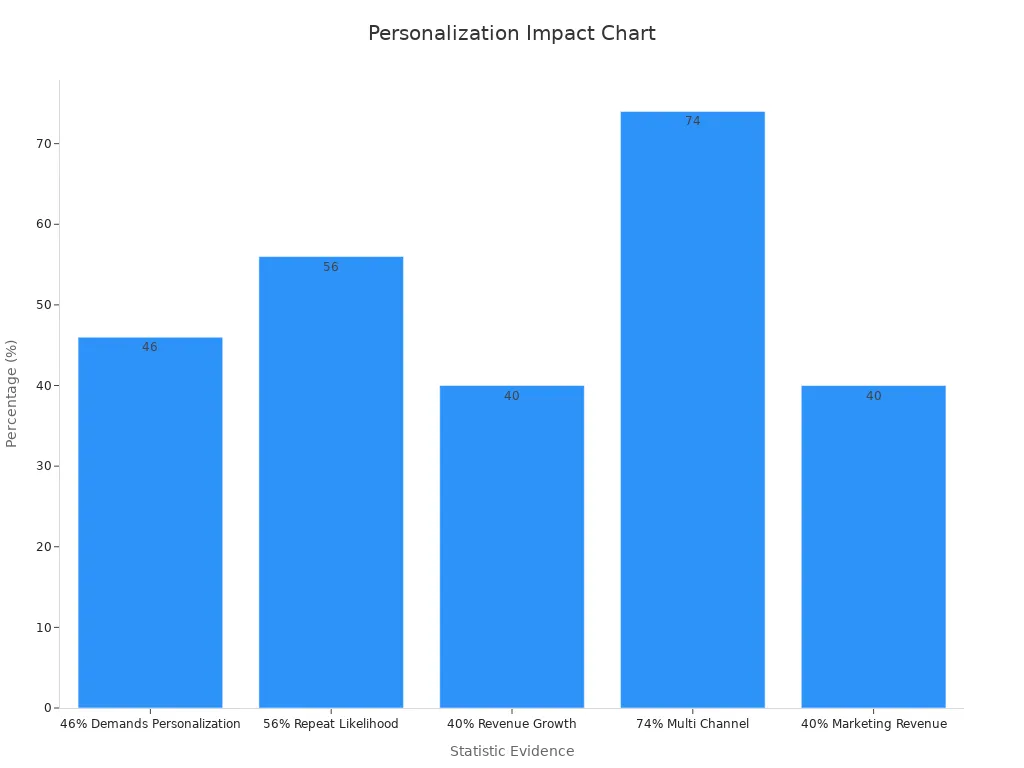
You see the power of ai-powered personalization every time you get hyper-personalized recommendations or special deals based on your interests. This feature keeps you engaged and helps ecommerce businesses grow.
Price Comparison
You don’t want to overpay. AI shopping tools make price comparison easy. These apps scan hundreds of ecommerce sites in seconds and show you the best deals. You see real-time prices, discounts, and even shipping costs. This feature helps you save money and find the best value without endless searching.
Price comparison tools improve the user experience by giving you confidence in your choices. You know you’re getting a good deal, and you can shop smarter. Ecommerce platforms use these features to attract budget-conscious shoppers and boost sales.
Deal Tracking
Missing out on a sale feels frustrating. AI shopping assistants solve this problem with deal tracking. You set alerts for your favorite products, and the app notifies you when prices drop or when special offers appear. This real-time assistance means you never miss a bargain.
Deal tracking makes shopping more exciting and helps you plan purchases. It also increases customer loyalty, since you trust the app to find the best deals for you. Ecommerce businesses benefit from higher engagement and more frequent visits.
Virtual Try-On
Buying clothes or accessories online can feel risky. Will it fit? Will it look good? Virtual try-on features use ai and augmented reality to let you see how products look on you before you buy. You can try on glasses, shoes, or even makeup using your phone’s camera.
Virtual try-on boosts your confidence and reduces returns. Eyewear retailers using this technology report big sales increases and fewer returns. Avon saw a 320% jump in conversions and a 33% higher average order value after adding virtual try-on. This feature makes shopping interactive and fun, turning you into a loyal customer.
Virtual try-on technology increases sales by up to 30% and reduces returns by 20%.
AR-powered try-ons can boost user engagement by 200%.
Customers spend more time on sites and share their try-on experiences, bringing in new shoppers.
AI Chatbots
You want answers fast. AI chatbots give you instant help, 24/7. These virtual shopping assistants answer questions, solve problems, and guide you through the checkout process. They handle simple requests quickly and pass complex issues to human agents when needed.
AI chatbots improve the user experience by making customer service faster and more reliable. From 2019 to 2021, chatbot interactions jumped by 2,350%, and problem-solving rates hit 92%. Customer satisfaction scores stay high, with over 70% of users rating chatbots 4 or 5 out of 5. Ecommerce companies save money and reduce call center queues, making service better for everyone.
Evidence Aspect | Details |
|---|---|
Interaction Increase | 2,350% increase in chatbot interactions via WhatsApp from 2019 to 2021 |
Customer Adoption | 1,590% increase in new customers using the chatbot in the same period |
Problem-Solving Rate | 19% increase, reaching 92% problem resolution by chatbot in 2021 |
Customer Satisfaction | Average rating of 3.9/5 in 2021, with over 70% ratings at 4 or 5 |
Cost Reduction | AI chatbots expected to reduce customer service costs by about 30% |
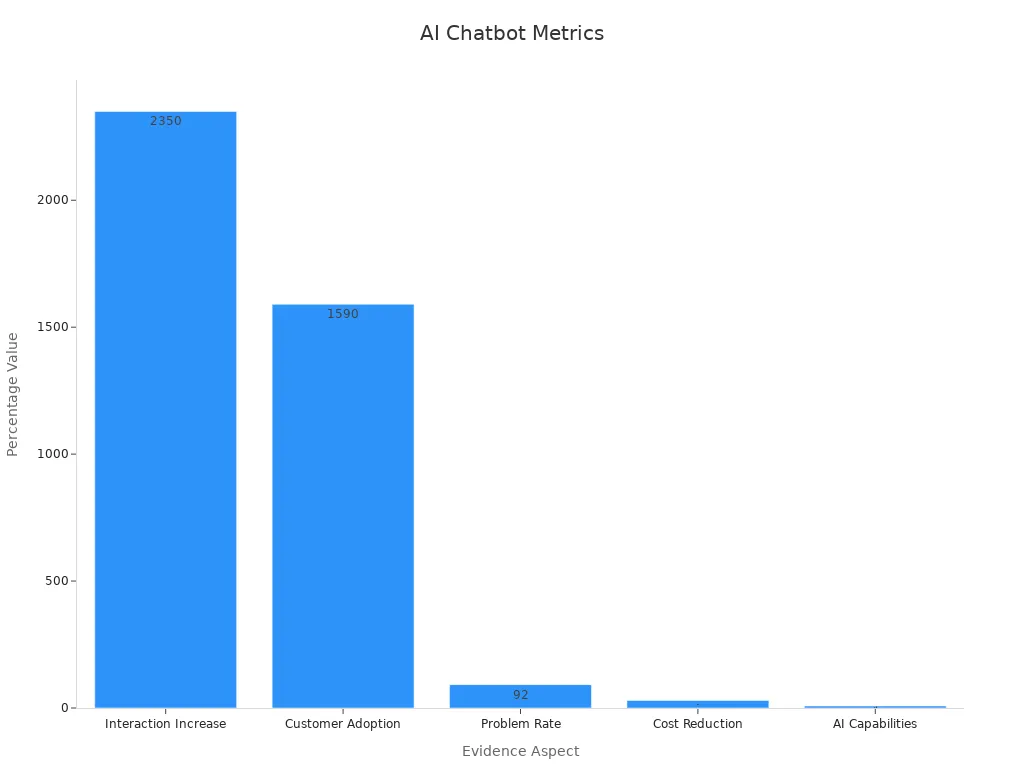
Seamless Payment
You want checkout to be quick and safe. Seamless payment features let you pay with one tap, use digital wallets, or even split payments. AI shopping apps keep your payment info secure and make the process smooth. This reduces abandoned carts and makes you more likely to finish your purchase.
Seamless payment improves the user experience by removing friction. Ecommerce businesses see higher conversion rates and happier customers.
Image Recognition
Ever see something you love but don’t know what it’s called? Image recognition lets you snap a photo and find similar products instantly. AI shopping assistants use this feature to match your photo with items in their database. You discover new products without typing a single word.
Image recognition makes shopping more visual and fun. It helps ecommerce stores show off their full inventory and reach customers who shop with their eyes.
Real-Time Inventory
Nothing feels worse than finding the perfect item, only to see it’s out of stock. Real-time inventory updates show you what’s available right now. AI shopping tools track stock levels and update listings instantly. You avoid disappointment and wasted time.
This feature improves the user experience by keeping you informed. Ecommerce businesses use real-time inventory to manage supply and demand, reducing lost sales.
Multi-Channel Support
You shop on your phone, laptop, and even in-store. Multi-channel support means your shopping experience stays consistent everywhere. AI shopping assistants connect your preferences, purchase history, and recommendations across all platforms.
Nearly 74% of customers use multiple channels in one transaction. Multi-channel support ensures you get personalized experiences no matter where you shop. Ecommerce brands use this feature to build loyalty and boost engagement.
Security
You want your data safe. AI shopping apps use advanced security features like encryption, fraud detection, and secure logins. These tools protect your personal and payment information.
Security builds trust and keeps you coming back. Ecommerce companies know that strong security is key to customer loyalty and long-term success.
AI shopping apps stand out because they combine these features to create a seamless, engaging, and secure user experience. Personalization, real-time assistance, and customization drive repeat purchases and boost ecommerce growth. When you use these apps, you get more than just convenience—you get a smarter way to shop.
Empirical research backs up the importance of these features. Studies show that trust, enjoyment, and habit play a big role in why people choose AI shopping apps. Personalized recommendations, fast support, and easy payments keep you coming back. Ecommerce businesses see higher sales, better engagement, and more loyal customers when they invest in these tools.
Benefits for Users and E-Commerce
Convenience
You want shopping to fit your busy life. AI shopping apps make this possible. You can search for products, get personalized recommendations, and check out in just a few taps. No more endless scrolling or waiting for help. In fact, 86% of people say they want to use AI to find product information quickly. About 80% of customers who use AI-powered shopping apps report a positive experience. These tools give you instant answers and help you shop anytime, anywhere.
Cost and Time Savings
AI shopping apps help you save money and time. They compare prices, track deals, and even alert you when your favorite items go on sale. You don’t have to spend hours searching for the best price. AI chatbots also cut down customer service wait times from 38 hours to just 5.4 minutes. Businesses save money too, with a 30% drop in customer service costs. This means you get faster help and better deals.
Measure/Metric | Quantitative Value/Statistic | Description/Impact |
|---|---|---|
Retailer revenue increase | Up to 15% | AI technology helps increase retailer revenues significantly. |
eCommerce AI adoption priority | 84% | Percentage of eCommerce businesses actively working on or prioritizing AI. |
Customer query resolution time | Reduced from 38 hours to 5.4 minutes | AI chatbots drastically reduce customer service response times. |
Customer service cost reduction | 30% | Cost savings achieved by using AI-powered chatbots instead of human agents. |
Influence of AI-powered product recommendations | 63% | Percentage of consumers influenced by AI recommendations in their purchases. |
Better Discovery
Finding new products feels easy with AI shopping apps. You get personalized recommendations based on your style and past purchases. These apps use smart discovery tools, like image search and voice assistants, to help you find exactly what you want. About 63% of shoppers say AI recommendations influence what they buy. You discover new brands, styles, and deals you might have missed before. Discovery becomes fun and effortless.
Customer Support
Great customer support makes your shopping experience better. AI chatbots answer your questions right away, day or night. You don’t have to wait for a human agent. About 73% of shoppers believe AI can improve their customer experience, and customer satisfaction can jump by 20% with AI support. You get help fast, and businesses keep you happy.
Tip: If you ever get stuck, try using the chatbot in your favorite e-commerce app. You’ll likely get a solution in minutes!
Sales Growth
AI shopping apps help e-commerce businesses grow. They use AI to boost sales, improve discovery, and keep customers coming back. Personalized recommendations and fast support lead to more purchases. The e-commerce market for AI agents is booming, with sales expected to jump from $3.6 billion in 2024 to $282.6 billion by 2034.
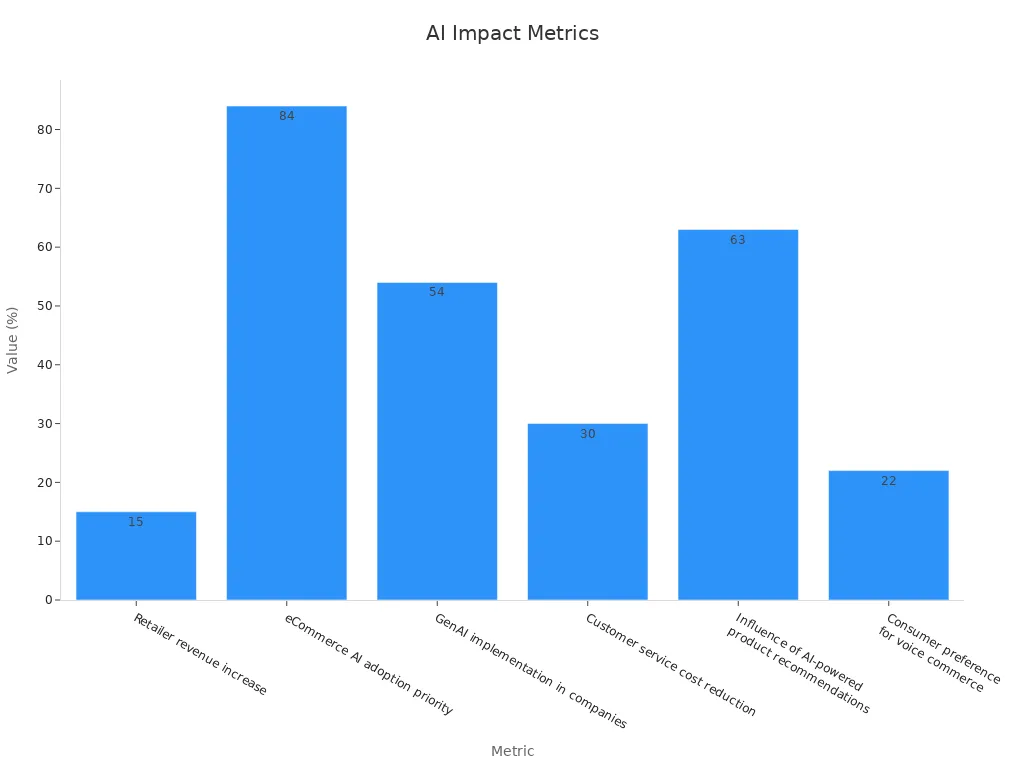
E-commerce companies see up to 15% more revenue and a big jump in customer engagement. AI-powered discovery, chatbots, and recommendations all work together to create an enhanced customer experience and drive business success.
Choosing the Right AI Shopping App
Picking the best AI shopping app can feel overwhelming, but you can make it simple by following a few clear steps. Here’s a handy guide to help you find the right fit for your needs.
Define Your Needs
Start by thinking about what you want from your shopping experience. Do you want faster checkouts, better product discovery, or more personalized recommendations? Many customers use survey tools like SurveyMonkey or Qualtrics to figure out what matters most to them. These tools help you spot trends and see what other shoppers value.
Feature Priorities
Not all apps offer the same features. Some focus on price comparison, while others shine with virtual try-on or deal tracking. Take a look at this table to see which features match current shopping trends:
Trend | What to Look For in an App |
|---|---|
Social shopping | Product discovery, social media links |
Direct-to-consumer shopping | Authentic products, real-time stock |
Privacy concerns | Strong data protection, clear policies |
Budget-consciousness | Deal alerts, spending trackers |
Custom recommendations, virtual try-on |
Tip: Make a list of your top three must-have features before you start comparing apps.
Compatibility
Check if the app works on your favorite devices. Some AI shopping apps run best on certain phones or browsers. You want an app that fits smoothly into your daily routine.
Ease of Use
A good shopping app should feel easy to use. Look for simple menus, clear buttons, and fast loading times. Tools like Hotjar help companies test how customers interact with their apps, so you get a better experience.
Security
You want your personal and payment info safe. Choose apps with strong security, like encryption and privacy-first design. Over 80% of customers say data protection is a top concern, so don’t skip this step.
Budget
Some AI shopping apps are free, while others charge for premium features. Costs can range from a few dollars a month to much more for advanced tools. Using open-source AI or pre-trained models can help keep costs down. Always check if the app’s price matches your budget and needs.
AI Shopping Assistant Comparison
Top Apps
You have a lot of choices when it comes to picking an ai shopping assistant. The market for these tools is booming. In 2024, the global ai shopping assistant market is worth about $4.3 billion, and experts expect it to reach $41.9 billion by 2034. This growth comes from more people shopping online and wanting real-time, personal help. You see big names like Amazon, Shopify, and Alibaba leading the way, but many new players are joining in too.
Virtual shopping assistants now hold a major share because they act like personal shoppers. They give you tailored suggestions and help you find what you want fast. Some apps use computer vision, others use natural language processing or machine learning. You get features like chat-based shopping, real-time inventory, and even voice commands. These tools help you compare products, track deals, and get answers right away.
Note: Over half of e-commerce businesses now use ai shopping assistants. About 17% of shoppers have made purchases using these tools, and 28% say they value them as a resource.
Feature Table
Here’s a quick look at how top ai shopping assistants stack up. You can see which features matter most for your shopping style.
AI Shopping Assistant | Key Features | Market/User Impact |
|---|---|---|
Shop.app (Shopify) | Personalized chat, dynamic memory, product showcase | Makes shopping simple and personal, great for indie brands |
Manifest AI | Advanced NLP, AI Nudge, quizzes, custom assistants | Boosts pre-purchase help, adapts to your behavior |
The Rep AI | Behavioral AI, real-time inventory, brand tone | Reduces drop-offs, increases engagement |
Shopmate | Generative AI, recommendations, price analysis | Learns from you, works with Shopify and WordPress |
Tidio AI | NLP chatbot, multi-channel, proactive chat | Handles 70% of queries, boosts sales for big items |
ShopWithAI | AI personas, price compare, AR, voice | Improves discovery and engagement with AR/voice |
ShopGuru | Honest AI answers, Chrome extension | Helps with Amazon research, gives trustworthy info |
You get more than just price checks. These ai shopping assistants use your purchase and pricing history to predict when you’ll switch brands or grab a deal. They compare products by price, size, ingredients, and more—not just by name. Some even forecast market prices in real time, so you always know if you’re getting the best value. Retailers use these tools to track competitors and adjust prices quickly, making your ecommerce experience smarter and more efficient.
AI Trends in E-Commerce

Generative AI
You might notice that shopping apps feel smarter every year. Generative AI is one big reason for this change. It helps apps create new content, answer your questions, and even suggest products in a way that feels personal. You can chat with a virtual assistant that sounds almost human. Some apps use generative AI to write product descriptions or create influencer content in seconds. This saves time and makes shopping more fun.
The market for generative AI in e-commerce is growing fast. Take a look at this chart to see how much it is expected to grow:
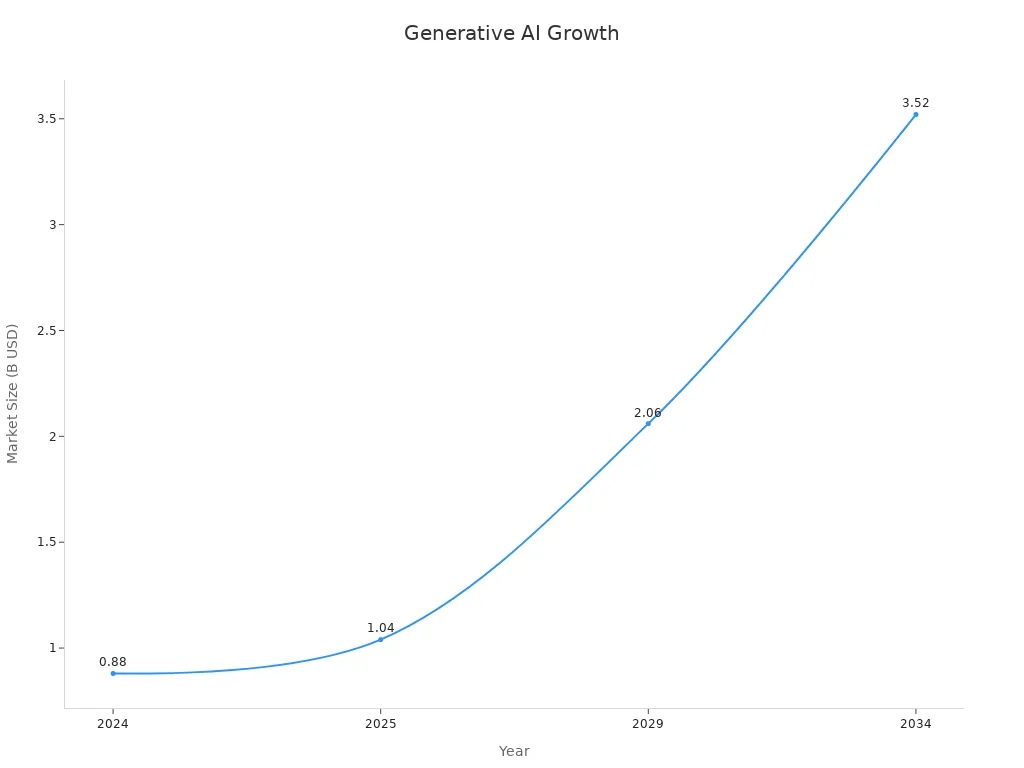
Here’s a quick table that shows the numbers:
Year | Generative AI in E-commerce Market Size (Billion USD) | CAGR (%) |
|---|---|---|
2024 | 0.88 | — |
2025 | 1.04 | 18.8 |
2029 | 2.06 | 18.6 |
2034 | 3.52 | 15.5 |
You can see that the market is set to triple in the next decade. Experts say the retail and e-commerce segment could grow at over 40% each year until 2030. That means you will see even more creative and helpful features soon.
Advanced Personalization
Shopping apps now know your style, your favorite brands, and even your mood. Advanced personalization uses AI to make your experience unique. You get product suggestions based on what you like, not just what’s popular. Some apps even use your browsing habits and feedback to improve their recommendations every time you shop.
Here are some cool trends you will see:
Hyper-personalized shopping journeys that match your mood and habits.
AI-generated influencer content that helps you find new products.
Virtual try-ons and AI styling assistants for fashion and beauty.
Voice shopping that lets you talk to your app and get what you need.
AI-driven product development that listens to customer feedback.
Note: Generative AI could add up to $4.4 trillion each year across many industries. In e-commerce, ai-powered personalization helps companies reach you with the right message at the right time. You get a shopping experience that feels made just for you.
These trends show that e-commerce is changing fast. You will see more smart features, better recommendations, and a shopping journey that feels easy and fun.
AI shopping apps bring you real benefits every time you shop. You get personalized recommendations, instant support, and secure shopping—all in one place.
You discover new products that match your style.
Chatbots answer your questions day or night.
Easy setup and strong privacy keep things simple and safe.
Multilingual support lets you shop your way.
Take a moment to think about what matters most to you. Try out a few top apps and see how much easier shopping can feel. Start exploring AI-powered shopping today!
FAQ
How do AI shopping apps keep my information safe?
AI shopping apps use encryption and secure logins to protect your data. You can check for privacy settings in the app. Always use strong passwords and update your app for the latest security features.
Can I use AI shopping apps on any device?
Most AI shopping apps work on both iOS and Android phones. Some also have web versions. You can check the app store or the company’s website to see if your device is supported.
Do AI shopping apps really help me save money?
Yes! These apps compare prices, track deals, and send you alerts when prices drop. You can find the best value without searching every site yourself. Many users say they save both time and money.
What if I need help while shopping in the app?
You can chat with an AI assistant or chatbot right in the app. They answer questions, help with orders, and solve problems fast. If you need more help, you can usually reach a human agent too.
Are AI shopping apps free to use?
Many AI shopping apps are free to download and use. Some offer extra features for a fee. You can start with the free version and upgrade if you want more advanced tools.
